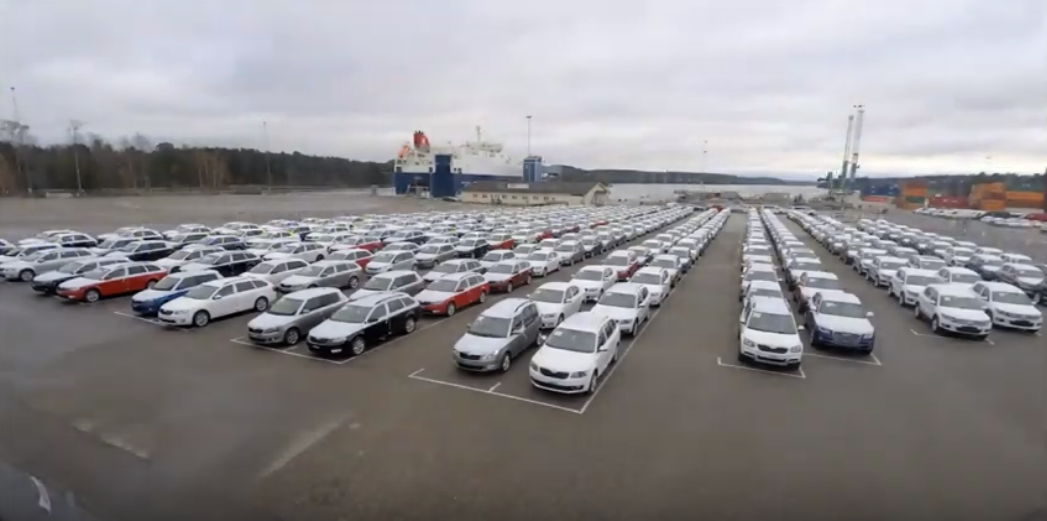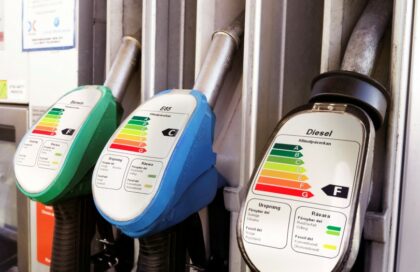The introduction of eco-labels on fuel pumps is a worthwhile first step to release the consumer power in the transport sector. The next step is to introduce eco-labels on vehicles, both in the exhibition room and in the marketing.
This debate article was published in the Swedish political magazine Altinget on March 4th 2019
Image: imported cars in the town of Södertälje. Photo: the Port of Södertälje
Prime minister Stefan Löfven said in his declaration of government in January 2019 that Swedish consumers should be able to make sustainable choices. In the agreement between the four parties that are part of or support the government it is said that the possibility to attach a ”passport” to all products with information about contents, origin and recycling shall be investigated.
Consumer information is particularly important in the transport sector, which gives rise to one third of the greenhouse gas emissions in Sweden. Everybody travels. The greenhouse gas emissions from the transport sector are the sum of the choices that are made by all of us. If we are given the chance to make informed choices these emissions can therefore be substantially reduced. At the moment we are going in the wrong direction: the greenhouse gas emissions from road transport in Sweden are increasing.
But there is more to sustainability than greenhouse gas emissions. The changeover to fossil free transport releases huge market forces in the search for new natural resources. Freely available information is necessary to steer these forces in a sustainable direction. Otherwise the riskt is large that we devastate of the last rain forests in order to cultivate oil palms for biodiesel, or that we exploit children as labour force when raw materials for electric car batteries are mined.
A comparison with the food market gives a glimpse of the potential of consumer power. It resembles the transport sector in the sense that its impact on the environment and its greenhouse gas emissions are also the sums of the choices made by everybody. But in this sector the consumer information is better. We can see in the supermarket where the fish is catched and where the beef cattle is bred; we can see whether the cookies contain palm oil. We can choose between a great many products with voluntary sustainability labels such as KRAV and Fairtrade.
The sale of organic food is increasing quickly. As a consequence, the share of agricultural land cultivated organically is also increasing quickly. In 2005 the share was 6 percent. In 2017 the share was approaching 17 percent. The consumer power is about to fundamentally change the way in which agricultural land is used in Sweden.
The previous government took the first step towards releasing the consumer power in a similar way in the transport sector. It decided to put eco-labels on all fuel pumps. The expected effects of this measure give a hint how consumer power may affect the transport sector.
When we see each time we fill our car the climate impact of the fuel, together with its raw materials and their place of origin, then abstract climate change and sustainability issues are coupled to a personal choice and a physical action. This gives rise to feelings and thoughts, and affect our future choices of fuels, vehicles, and modes of transportation.
The eco-label on the fuel pump will reflect those fuels the specific supplier produced or bought the previous year. In this way the suppliers are given the opportunity to compete with sustainability in a transparent and fair way.
More generally, the eco-labels will help educating and sensitizing the citizens. This pushes the politicians forward and facilitates radical decisions, such as eventually putting an end to the sale of fossil fuels.
Thus we cannot speak of personal responsibility as opposed to political responsibility. The one facilitates the other. Consumer power, regulations and economical means of control go hand in hand.
Many countries also need to go hand in hand. The climate crisis is global, and so is the fuel and car industry. Therefore we need international rules to make the changeover to sustainable transport happen. But it is equally important that single countries dare to take a step forward on their own and inspire others.
The former Governor of California Arnold Schwarzenegger recently said that it is fantastic that Sweden will become the first country in the world that put climate change labels on gas pumps. “It lets all people be part of the crusade”, he said. “That’s what people always want to know: what can I do as anordinary person to contribute and make sure that we have a green and clean energy future.” Recently an op-ed was published in the San Francisco Chronicle which encourages California to follow the example of Sweden.
In other cases Sweden must learn from the US. There a sticker is attached to the window of all new cars with information about tail pipe emissions, consumption and fuel economy. Back home in Sweden, not even the general agents sometimes know the consumption of their plug-in hybrids when they run on electricity or fuel.
The official report Fossil free road transport (Fossilfrihet på väg), commissioned by the Swedish government, proposed in 2013 an energy efficiency label on new cars of the same kind as in the US. But nothing has happened since then. The government has to bring this issue to life. A standardized eco-label should be found in the window of all new vehicles, and in all other places where they are marketed.
It is not enough to disclose the emissions from the exhaust pipe. It is equally important to know in what way the production of the car affects environment and climate. Such a sustainability disclosure would benefit recycling, for instance of electric car batteries. It takes a lot of energy to produce these batteries and the process gives rise to large greenhouse gas emissions, if the electric power that is used has fossil origin.
This would require a standardized life cycle assessment of vehicles, which in turn requires traceability of its components. Such traceability would make it possible to decide whether raw materials like cobalt have been extracted in socially sustainable ways, and would open the door for voluntary social sustainability labels of the same kind as on coffee or bananas.
We call for action by the Swedish government, the parliament and the Swedish members of the European parliament:
- Promote eco-labels on fuel pumps of the Swedish type in the entire EU.
- Secure the traceability of all fossil fuels, in the same way as biofuels are traceable. This would improve the eco-labels on fuel pumps.
- At the EU-level, promote the introduction of standardized life cycle assessment of cars, and the requirement that all manufacturers shall make such an assessment public for each car model.
- Introduce a Swedish eco-label for vehicles. Don’t wait for a standardized life cycle assessment, but improve the eco-label along the way.
The potential of consumer power is proved by the fact that strong interests want to prevent its release. For example, the oil industry choked a proposal by the EU commission in 2011 to trace the raw materials for fossil fuels.
A market that takes us towards sustainable transport does not appear by itself. It takes actors armed with knowledge. Persistent political work is necessary to give them this knowledge.
Johanna Grant, chairperson, the Green Motorists
Martin Prieto Beaulieu, secretary general, the Green Motorists
Per Östborn, campaign manager, the Green Motorists

